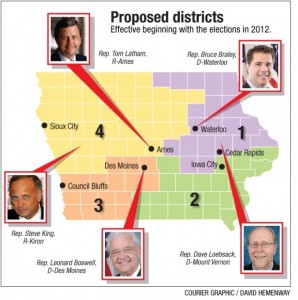 Before and during my time in the state Senate, I taught political science for a decade, and no issue fascinated my students more than redistricting. Once I opened class during the week on redistricting by bringing several chairs to the front of the lecture hall, turning on Snoop Dogg’s anthem “Who Am I?”, and leading students in a game of Musical Chairs. (I picked Snoop because the mentality of politicians facing redistricting is pure gangsta: you do whatever you need to do to survive. Also, I wanted students to think that in a past life, I was pretty cool.)
Before and during my time in the state Senate, I taught political science for a decade, and no issue fascinated my students more than redistricting. Once I opened class during the week on redistricting by bringing several chairs to the front of the lecture hall, turning on Snoop Dogg’s anthem “Who Am I?”, and leading students in a game of Musical Chairs. (I picked Snoop because the mentality of politicians facing redistricting is pure gangsta: you do whatever you need to do to survive. Also, I wanted students to think that in a past life, I was pretty cool.)
It was thru the prism of Musical Chairs that I explained how redistricting works in states that lose a congressional seat, as Missouri has this year. The seat that disappears under the Republican-drawn map is the seat I contested back in 2004. (In the interest of full disclosure, it is occupied by Congressman Russ Carnahan (D-MO), the man who narrowly beat me and pursued an FEC complaint about an anonymous postcard mailed at the end of the campaign, the knowledge of which I hid from the feds, ultimately leading to my prison term.)
In any case, the current situation has inspired quite a bit of internecine tension. For instance, according to Politico, after their districts were combined in a way perceived as unfavorable to him, Rep. Carnahan recently told fellow Missouri Democratic Rep. Lacy Clay to f- off. In his public response, Rep. Clay channeled former warrior-entertainers “Nature Boy” Ric Flair and Muhammad Ali. The F-bombs weren’t limited to the Democratic side: Republican leaders of the House and Senate were also at odds in their attempt to draw a map that appeased the varied interests at the table.
Although in a macro-sense – in terms of the battle for the U.S. House – redistricting is a battle between Democrats and Republicans, the micro-cosmic battle that actually plays out in most states is a very different one: it’s hand-to-hand combat between fellow partisans who want to represent the same like-minded voters. That’s why Rep. Carnahan (D) is telling Rep. Clay (D) to f— off, and why Missouri’s House Speaker and Senate President (both Republicans) aren’t on speaking terms.
Of course, battles over the shape of districts are nothing new. From Massachusetts Governor Gerry’s 1812 salamander-like district, to the grotesquely-shaped map North Carolina drew in the 1990s in an attempt to create two majority-black districts without sacrificing white Democratic incumbents, to the recently-vetoed Missouri map that House Republicans are likely to override, politicians have divided communities for political gain for two centuries. In recent decades, the advent of increasingly sophisticated redistricting software has enabled map-drawers to parcel out neighborhoods for political advantage one block at a time – right down to the house.
******
But as Iowa has shown the nation for decades, it doesn’t have to be this way. In Iowa, a nonpartisan agency within the Legislature plugs a complicated algorithm into a computer that ensures congressional districts’ compactness, contiguity, and equality of population, while respecting political subdivisions.
Equally important, Iowa requires that the districts “shall not be drawn to favor any political party, an incumbent legislator or member of Congress, or any other person or group, or for the purpose of augmenting or diluting the voting strength of a language or racial minority group.” And to ensure compliance with this, Iowa prohibits consideration of the addresses of incumbents, the political affiliation of registered voters, previous election results, or demographic data other than simple head counts.
The results of all this common sense? Well, they pretty much speak for themselves.
As evidenced in the above articles, despite the fact that two pairs of Iowa congressman were drawn into the same district, they’re not cursing each other on the House floor. It’s not that the pols due north of here are more magnanimous than Missouri pols; trust me, I worked in Iowa for a year on a presidential campaign, and they’re no different. The difference is that in Iowa, the rules of the game summon the better angels of politicians’ natures. In Missouri – as in most states – the rules of the game encourage backbiting, secrecy, and double-dealing by making every pol think that he/she can somehow get an edge over the other guy.
And often, the congressmen who spend time (while they should be governing) figuring out how to get that edge, and are the savviest players of the game, win. Those who don’t mind their political shop back home lose. And, many pols would say, deservedly so.
Iowa pols know they can’t get an edge over a computer algorithm. So they spend their time governing, instead of maneuvering.
******
For decades, political scientists have studied the troubling impacts of gerrymandering: the decreased competitiveness of districts, the attendant appeals to far-left and far-right elements within each party, and the consequent partisan polarization and incivility of a U.S. House whose members understand that they their main electoral threats are likely to come in primary rather than general elections. And those are indeed serious problems for representative democracy – especially a democracy facing challenges as grave as our nation’s long-term fiscal morass and other issues requiring bipartisan solutions.
But perhaps equally problematic are the ways in which the hyper-politicized redistricting process not only distracts representatives from their governing duties for two years each decade, but also encourages intraparty warfare as pols battle for the same sets of voters to pad their margins.
I admit that I crave the drama and intrigue of redistricting as much as any political junkie you’ll ever meet, but like the crackhead desperate to quit, I realize that the habit is self-destructive – and destructive to the broader community, too. It’s time for the Iowa model to spread to the rest of the nation and cut junkies like me off from our redistricting fix once and for all.












Leave a Reply